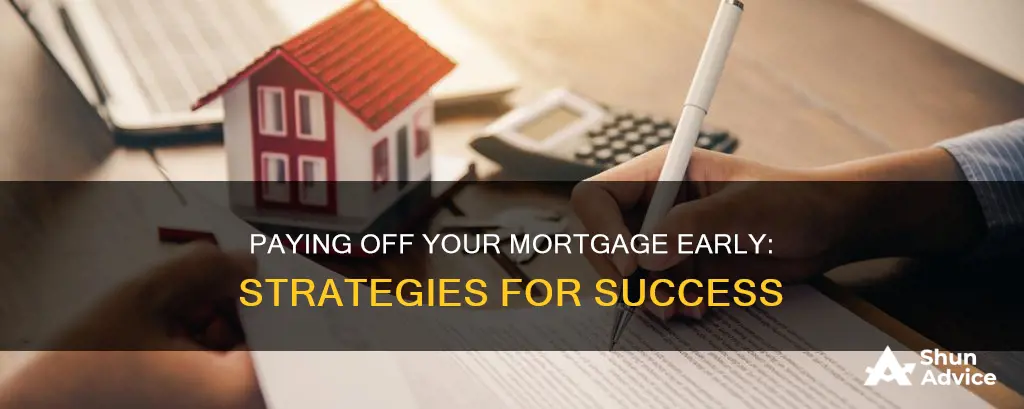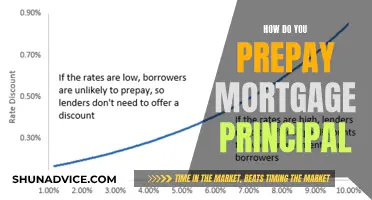
Paying off your mortgage early can be a great financial goal to set for yourself, as it can provide freedom from debt and help build wealth. While it may not always make the most fiscal sense, it can give peace of mind and financial stability. There are several strategies to pay off your mortgage early, including making extra payments, increasing your payment amount, or refinancing. It's important to be diligent and intentional with your budget, and to use tools like a mortgage payoff calculator to evaluate your options and see how extra payments can save on interest and shorten your mortgage term.
| Characteristics | Values |
|---|---|
| Benefits | Financial freedom, debt-free, build wealth, save money, build equity, flexibility to change careers, save for retirement |
| Strategies | Make extra payments, increase payment amount, refinance, pay more frequently (bi-weekly), pay a lump sum, round up payments, pay a little extra each month, pay off other debts first |
| Considerations | Prepayment penalties, inform lender that extra payments are to be applied to principal, use a mortgage payoff calculator, check with lender, check real estate trends, check interest rate |
What You'll Learn

Budgeting and cutting back on expenses
Create a budget and track your spending
Start by creating a monthly budget that outlines your income and expenses. Write down all your sources of income and make a detailed list of your expenses, including both fixed and variable costs. Subtract your total expenses from your total income to ensure you're not overspending. Once you have a clear picture of your financial situation, track your spending throughout the month to make sure you're sticking to your budget.
Reduce your grocery budget
Groceries can be a significant expense, especially for larger families. To cut back on grocery costs, consider changing stores or shopping for sales and in-season produce. Look for discounts, buy in bulk when possible, and plan your meals to reduce food waste.
Cut back on eating out
Eating out at restaurants or ordering takeout can add up quickly. Instead, cook at home more often and pack your own lunches. This may require some meal planning and preparation, but it can significantly reduce your expenses.
Find other areas to cut back
Review your budget to identify other areas where you can reduce spending. For example, you might cut back on entertainment or subscription services, shop around for better deals on insurance or utilities, or reduce discretionary spending on things like clothing or hobbies.
Increase your income
In addition to cutting expenses, look for opportunities to increase your income. This could include asking for a raise at your current job, taking on a side hustle or freelance work, or selling unwanted items. Any extra income you earn can go directly towards paying off your mortgage faster.
Make extra payments towards your principal
If your budget allows, consider making extra payments towards your mortgage principal. Even small additional payments can help reduce the term of your loan and save you money on interest. Just be sure to inform your lender that you want these extra payments applied to the principal and not the following month's payment.
Remember, paying off your mortgage early can provide financial freedom and help you build wealth. It's important to stay disciplined and focused on your goal, as it may require sacrificing some non-essential expenses in the short term.
Mortgage Assumption: Family Matters and Money
You may want to see also

Making extra payments
Another strategy is to increase your payment by $1 each month. For example, you can start by paying $900 the first month, $901 the second month, and so on. This method, known as the "dollar-a-month strategy," can be a financially feasible option if your income increases gradually over time. By implementing this strategy, you could significantly reduce the term of your mortgage. For instance, for a 30-year, $900-per-month mortgage with a 6% fixed interest rate on a loan of $150,000, you could reduce the term by eight years.
You can also make extra payments on the principal balance of your mortgage loan. This will not only help you pay off your mortgage debt faster but also save you thousands of dollars in interest. It is important to inform your lender that any extra payments should be applied to the principal balance and not the following month's payment or interest. By doing so, you can avoid prepayment penalties and ensure that your extra payments have the maximum impact on reducing your loan term.
Before making extra payments, it is advisable to check with your mortgage company about their policies on extra payments. Some companies may only accept extra payments at specific times or may charge prepayment penalties. Additionally, consider using a mortgage payoff calculator to see how much time and money you can save by making extra payments. This will help you make informed decisions and determine the best strategy for paying off your mortgage early.
Understanding Mortgage Constants: Calculating the Constant for Your Loan
You may want to see also

Increasing your payment amount
Check for Prepayment Penalties
Before making extra payments, it is important to check with your lender about any prepayment penalties. Some mortgage loans have fees for paying off the loan early. However, many mortgage loans do not have prepayment penalties. It is crucial to understand the terms of your loan to avoid unexpected costs.
Inform Your Lender
When making extra payments, inform your lender that you want the additional amount applied to the principal balance, not the following month's payment or interest. By allocating the extra payment to the principal, you reduce the amount of your loan and save on interest.
Use a Mortgage Payoff Calculator
A mortgage payoff calculator can help you understand how increasing your payment amount will impact your loan. You can input your loan details, including the remaining balance, interest rate, and monthly payment, to see how much time and money you could save by increasing your payments. This tool can help you make an informed decision about how much extra to pay.
Strategies for Increasing Payments
There are several strategies you can employ to increase your payment amount:
- Pay 1/12 extra each month: For example, if your monthly payment is $900, pay $975 instead. This strategy helps you accumulate the equivalent of an extra payment by the end of the year.
- Round up your payments: When budgeting, round up your monthly payment to the next highest $100. For instance, increase your payment from $743 to $800 or from $860 to $900.
- Dollar-a-month strategy: Increase your payment by $1 each month. Start by paying $900 the first month, $901 the second month, and so on. This approach is feasible if your income increases gradually over time.
- Lump-sum payments: If you receive unexpected windfalls or have saved up a significant amount, consider making a large one-time payment towards your mortgage.
Benefits of Increasing Payment Amount
- Reduced interest costs: By paying more towards the principal, you can save thousands of dollars in interest over the life of the loan.
- Shorter mortgage term: Increasing your payment amount can help you pay off your mortgage years earlier, giving you financial freedom and stability.
- Improved cash flow: Paying off your mortgage early eliminates future payments, improving your cash flow and enabling you to allocate that money towards other financial goals or investments.
Finding Mortgage Foreclosures in Galveston County: A Guide
You may want to see also

Rounding up your payments
One strategy to pay off your mortgage early is to round up your payments. This method is budget-friendly and can help you reduce the term of your mortgage significantly.
Here's how it works: when budgeting for your mortgage payment, round up to the next highest $100 amount. For example, if your monthly mortgage payment is $743, you would round it up to $800. Similarly, if your payment is $860, you would pay $900 instead. This strategy is called the "dollar-a-month" strategy and is feasible if your income increases slightly but consistently over time. Each month, you would increase your payment by $1. So, for instance, you would pay $900 the first month, $901 the second month, and so on.
By implementing this strategy, you can significantly reduce the term of your mortgage. For example, consider a 30-year, $900-per-month mortgage with a 6% fixed interest rate on a loan of $150,000. By rounding up your payments, you could reduce the term of this mortgage by eight years.
It is important to note that some lenders may charge a prepayment penalty if you pay off your mortgage early. Therefore, it is advisable to check with your lender before making extra payments. Additionally, ensure that your extra payments are applied to the principal balance rather than the following month's payment to maximize your savings.
Strategies to Remove Mortgage Insurance: A Homeowner's Guide
You may want to see also

Refinancing
Secondly, you can refinance to a lower rate but keep making the same higher payments, reducing your principal balance faster. This means that even though you are paying off a lower rate, you will be able to pay off the debt faster.
Thirdly, you can take a cash-out refinance to clear all your higher-interest debt, and then use the monthly savings to accelerate the repayment of the mortgage. However, this option increases the amount of the loan, raises your monthly payments, and means you will be paying more in interest initially, in addition to paying refinancing transaction costs.
Finally, you could refinance and use the cash out as a down payment on a second home. This is a good option if your current home has gained value over time and you are not ready to sell.
Before making any decisions, it is recommended that you consult a wealth advisor to look at your finances and long-term wealth management plan.
Cashing Out Refinance Mortgages: Strategies for Homeowners
You may want to see also
Frequently asked questions
Here are some strategies to pay off your mortgage early:
- Make extra payments
- Increase your payment amount
- Refinance
- Pay more towards the principal balance of your mortgage loan
- Create a budget and cut back on expenses
Before you start making extra payments, check with your mortgage company first. Some companies only accept extra payments at specific times or may charge prepayment penalties.
By paying off your mortgage early, you can save thousands of dollars in interest. For example, a one-time additional payment of $1,000 towards a $200,000, 30-year loan at 5% interest can save you $3,420 in interest.
If you claim the mortgage interest tax deduction, paying off your mortgage early will lead to a higher tax bill. However, you would pay more in interest by keeping your mortgage than you would save in taxes. Additionally, paying off your mortgage early may result in a prepayment penalty, which is a fee charged by some lenders for paying off your mortgage early.







